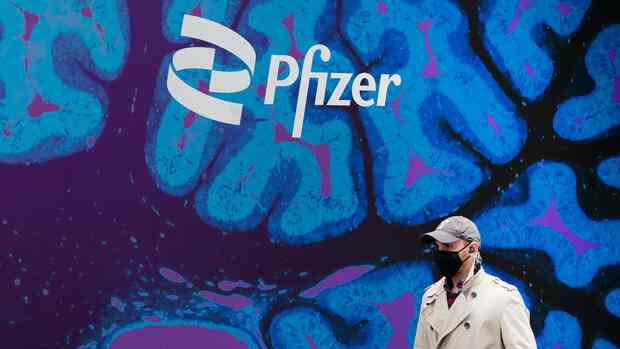The US pharmaceutical company takes over the cancer specialist Seagen for 43 billion dollars.
(Photo: AP)
Frankfurt The US group Pfizer is using its billions in revenue from the corona pandemic and is planning the largest takeover in the pharmaceutical industry in a good four years. Pfizer wants to buy the biotech company Seagen for around 43 billion dollars and thus significantly strengthen its product pipeline in the field of cancer drugs.
“Together, Pfizer and Seagen aim to advance the next generation of breakthrough cancer drugs,” said Pfizer CEO Albert Bourla about the acquisition. Seagen shareholders are expected to receive $229 per share, a premium of nearly a third to last Friday’s closing price.
The takeover confirms the expectations of many industry observers that last year’s acquisition slump should be over. In December, the American pharmaceutical and biotech group Amgen announced that it was taking over Ireland’s Horizon Pharmaceuticals for $28 billion.
Another indication of this is the $2.9 billion acquisition of the biotech company Provention Bio, which the French pharmaceutical giant Sanofi also announced on Monday.
The patents on important sources of revenue for many large pharmaceutical companies will expire in the coming years. As a result, the corporations are under pressure to supplement their product ranges with new, innovative medicines – also by buying biotech companies and their developments. Due to the high income from the corona business and various spin-offs and sales in recent years, the pharmaceutical companies also have very solid financial strength.
Pfizer expects sales to collapse after the corona boom
Pfizer has tripled its own net profit in the past two years to $31 billion, mainly thanks to the Covid vaccine Comirnaty developed together with Biontech and the Covid drug Paxlovid. However, the Covid business is now shrinking significantly, while the other pharmaceutical business is growing only moderately. Important patents will also expire at Pfizer in the next few years.
The group therefore wants to increase its sales potential by 25 billion dollars through acquisitions by 2030. According to Pfizer, it has already secured around ten billion dollars of this through smaller deals in the last two years. This included the purchase of the biotech companies Biohaven and Global Blood Therapeutics.
Pfizer expects the products of the new Seagen acquisition to achieve “risk-adjusted” sales of another ten billion dollars by 2030, which would bring it much closer to its own goal. In 2022, Seagen had sales of around two billion dollars with a total of four approved cancer drugs and royalties.
Merck & Co. was also interested in Seagen
In the oncology business, Pfizer is currently the seventh largest provider with 24 marketed products and most recently around twelve billion dollars in sales. The segment is considered a potential growth market due to the high medical demand and advances in research. However, sales of oncology products from Pfizer and several other manufacturers fell last year for the first time in years due to patent expirations. With the takeover of Seagen, Pfizer now wants to counteract the product range and the technology base.
The biotech company Seagen, founded in 1998 and based in Bothell near Seattle, employs a good 3,000 people and is considered a pioneer in the field of antibody-drug conjugates, a new class of cancer drugs that are currently causing a sensation in the market. Antibodies are coupled with a cytotoxin, which is then transported to the tumor cells in a targeted manner. The US pharmaceutical company Merck & Co. is said to have been interested in taking over Seagen last year.
A total of around a dozen such antibody conjugates have been approved so far, and another 100 are in clinical trials. German biotech companies such as Heidelberg Pharma and the Munich start-up Tubulis are also working in the field. The cancer drug Enhertu, developed by Daiichi Sankyo and Astra-Zeneca, is currently regarded as a particular success for the class of active ingredients, which showed very good effects in certain forms of breast cancer.
For Pfizer, the Seagen acquisition is its largest acquisition since its $67 billion acquisition of pharmaceutical company Wyeth in 2009. Other major acquisitions in the industry over the past decade have included Bristol-Myers Squibb’s $74 billion acquisition of biotech company Celgene, the purchase botox maker Allergan by Abbvie for $63 billion; and Alexion by Astra-Zeneca for $39 billion.
More: Pfizer is reportedly sounding out a billion-dollar deal


